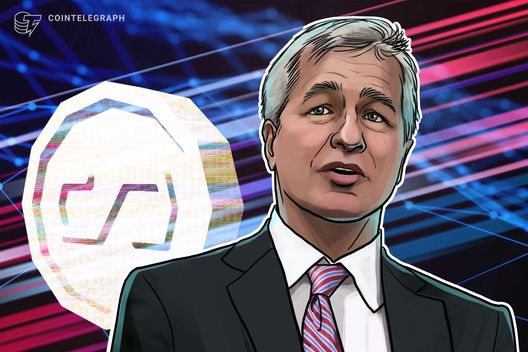

Jamie Dimon, the CEO of JPMorgan Chase, has historically been known for his skepticism towards cryptocurrencies, particularly Bitcoin. However, recent statements and actions from JPMorgan suggest a shift in Dimon's perspective, specifically regarding stablecoins and blockchain technology. This evolution signals a potential turning point for the integration of traditional finance and the digital asset space.
Dimon's evolving stance was highlighted during JPMorgan's second-quarter earnings call, where he stated the bank's intention to become more involved with stablecoins. Stablecoins are cryptocurrencies designed to maintain a stable value by being pegged to another asset, such as the U.S. dollar. While Dimon admitted he doesn't understand the appeal of stablecoins over traditional payment methods, he acknowledged the need for JPMorgan to be involved in the space to understand it and remain competitive with fintech companies. He recognized that fintech companies are innovating by creating bank accounts, payment systems, and rewards programs, and JPMorgan needs to be aware and participate in these developments.
This move towards embracing stablecoins is further evidenced by JPMorgan's development of its own deposit token, JPMD, which is currently available to the bank's clients. JPMD is a stablecoin-like token. In June 2025, the bank announced its USD deposit token called “JPMD” from Kinexys, JPMorgan Chase's blockchain business unit, to be issued for its pilot on the blockchain Base. While JPMD is currently a permissioned token, it is expected to eventually be available exclusively to J.P. Morgan institutional clients. Kinexys by J.P. Morgan has launched a USD J.P. Morgan Deposit Token (JPMD) proof-of-concept (PoC) on public blockchain, as an alternative to stablecoins for native cash settlement and payments use cases for J.P. Morgan institutional clients.
Furthermore, JPMorgan has been actively developing and expanding its blockchain platform, Kinexys. Formerly known as Onyx, Kinexys is one of the first bank-operated blockchains globally. JPMorgan plans to enhance the platform to drive broader adoption of blockchain technology and tokenization across mainstream financial services. As of November 2024, JPMorgan's blockchain platform has processed over $1.5 trillion since its launch a few years ago, and the bank estimates that Kinexys now handles roughly $2 billion per day. The platform will now be called Kinexys, and the company's payment settlement system, JPM Coin, will be rebranded as Kinexys Digital Payments. In addition to the rebrand, JPMorgan announced plans to introduce on-chain foreign exchange conversions to the platform next year. Initially, the program will facilitate U.S. dollar to euro conversions, with plans to add more currencies in the future.
JPMorgan's increased involvement in the crypto space also includes a recent partnership with Coinbase. This partnership will allow Chase credit card holders to use their cards to buy crypto on Coinbase starting in the fall of 2025. Additionally, in 2026, JPMorgan's customers will be able to redeem their Chase Ultimate Rewards Points for USDC, marking the first time a major rewards program will be redeemable for crypto. Coinbase also said Chase card users can link their accounts to Coinbase directly. This integration will give users easier ways to buy crypto.
The shift in Dimon's and JPMorgan's attitude towards stablecoins and blockchain technology comes amid growing regulatory clarity and increasing adoption of digital assets. The U.S. House of Representatives is considering a bill that would establish a framework for private companies to issue stablecoins. The gap between cryptocurrency and traditional finance is narrowing in 2025, driven by relaxed regulatory oversight and a push for comprehensive federal cryptocurrency legislation, as evidenced by the signing of the Guiding and Establishing National Innovation for U.S. Stablecoins Act into law by President Donald Trump earlier this month. Other major financial institutions, such as Mastercard and Citi, are also exploring stablecoins.
Despite his growing acceptance of stablecoins and blockchain, Dimon remains skeptical of Bitcoin. In a recent CNBC interview, he stated, "I'm a believer in stablecoin, a believer in blockchain, not personally a believer in Bitcoin". Nevertheless, JPMorgan's move towards integrating stablecoins and blockchain technology into its services signifies a major step forward for the convergence of traditional finance and the digital asset market.